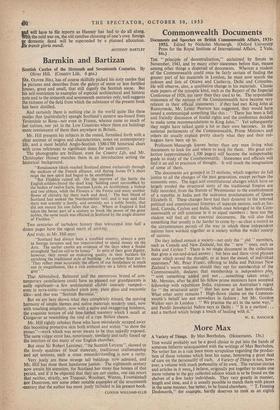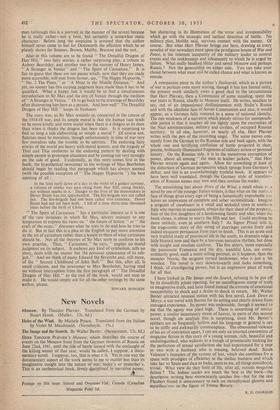More Max
A Variety of Things. By Max Beerbohm, (Heinemann. 15s.) THIS would probably not be a good choice to put into the hands of someone hitherto unacquainted with the writings of Max Beerbohm. No writer has as a rule been more scrupulous regarding the produc- tion of those volumes which bear his name, bestowing a great deal of care on the personality of each. A Variety of Things is not, how- ever, a volume with much personality of its own. The various stories and articles in it were, I believe, originally put together to make one more volume in the gay collected edition which is to be found on the shelves of a few lucky individuals. They vary greatly in manner, length and time, and it is usually possible to match them with pieces in the same manner, but better, to be found elsewhere. " T. Fenning Dodsworth," for example, hardly deserves to rank as an eighth man (although this is a portrait in the manner of the seven) because he is really rather—not a bore, but certainly a somewhat static character. Before long the suspicion is aroused that the author himself never came to feel for Dodsworth the affection which he so plainly shows for Soames, Brown, Maltby, Braxton and the rest.
Also in this volume are to be found " The Dreadful Dragon of Hay Hill," two fairy stories, a rather surprising play, a tribute to Aubrey Beardsley, and another two in the manner of Henry James, " A Stranger in Venice" and " The Spirit of Caricature." It is fair to guess that these are not pieces which, now that they are made more accessible, will oust from favour, say, "The Happy Hypocrite," " No. 2 The Pines," or "A Moat in the Middle Distance." And yet, no sooner has this carping judgment been made than it has to be qualified. What a happy fate it would be to find a simultaneous introduction to Sir Max and the city of Venice through the medium of "A Stranger in Venice." Or to go back to the drawings of Beardsley after discovering him here as a person. And how well " The Dreadful Dragon of Hay Hill " keeps its freshness.
The story was, as. Sir Max reminds us, conceived in the course of the 1914-18 war, and its simple moral is that the human race tends to be more kindly and more social when there is a dragon at its door than when it thinks the dragon has been slain. Is it surprising to find so long a tale elaborating so simple a moral ? Of course not. Satirists must be moralists, though unfortunately in time of war very few moralists take the trouble to be satirists. The enduring fairy stories of the world are heavy with moral lessons, and the tragedy of Thol and Thia conforms to the enduring pattern by dealing with simple people in grotesque situations and by coming out very strongly on the side of good. Incidentally, as this story'comes first in the book, the hypothetical newcomer to the writings of Max Beerbohm should begin by reading this paragraph which has always seemed (with the possible exception of " The Happy Hypocrite ") the best opening of all :
In the faint early dawn of a day in the midst of a golden summer, a column of smoke was seen rising from Hay Hill, rising thickly, not without sparks in it. Danger to the lives of the dressmakers in Dover Street was not apprehended. The fire-brigade was not called out. The fire-brigade had not been called into existence. Dover Street had not yet been built. I tell of a time thirty-nine thousand years before the birth of Christ.
" The Spirit of Caricature " has a particular interest as it is one of the rare instances in which Sir Max, always resistant to any temptation to express his views on " the future of fiction " or " the craft of the essay," discusses what he tries to do and how he tries to do it. But in fact this is a plea to the English to pay more attention to the art of caricature rather than a lesson to them of what caricature should be. Not all the theories of Sir Max seem to conform to his own practice. Thus, " Caricature," he says, " implies no moral judgment on its subject. It eschews any kind of symbolism, tells no story, deals with no matter but the personal appearance of its sub- ject." And we think of many Edward the Sevenths and, still more, of the " Second Childhbod of John Bull." But this, after all, is small criticism, and the newcomer to Max Beerbohm, having read on without interruption from the first paragraph of " The Dreadful Dragon of Hay Hill " to the end of the book, would not stop to make it. He would simply ask for all the other writings by the same author, please.
EDWARD HODGKIN



































 Previous page
Previous page